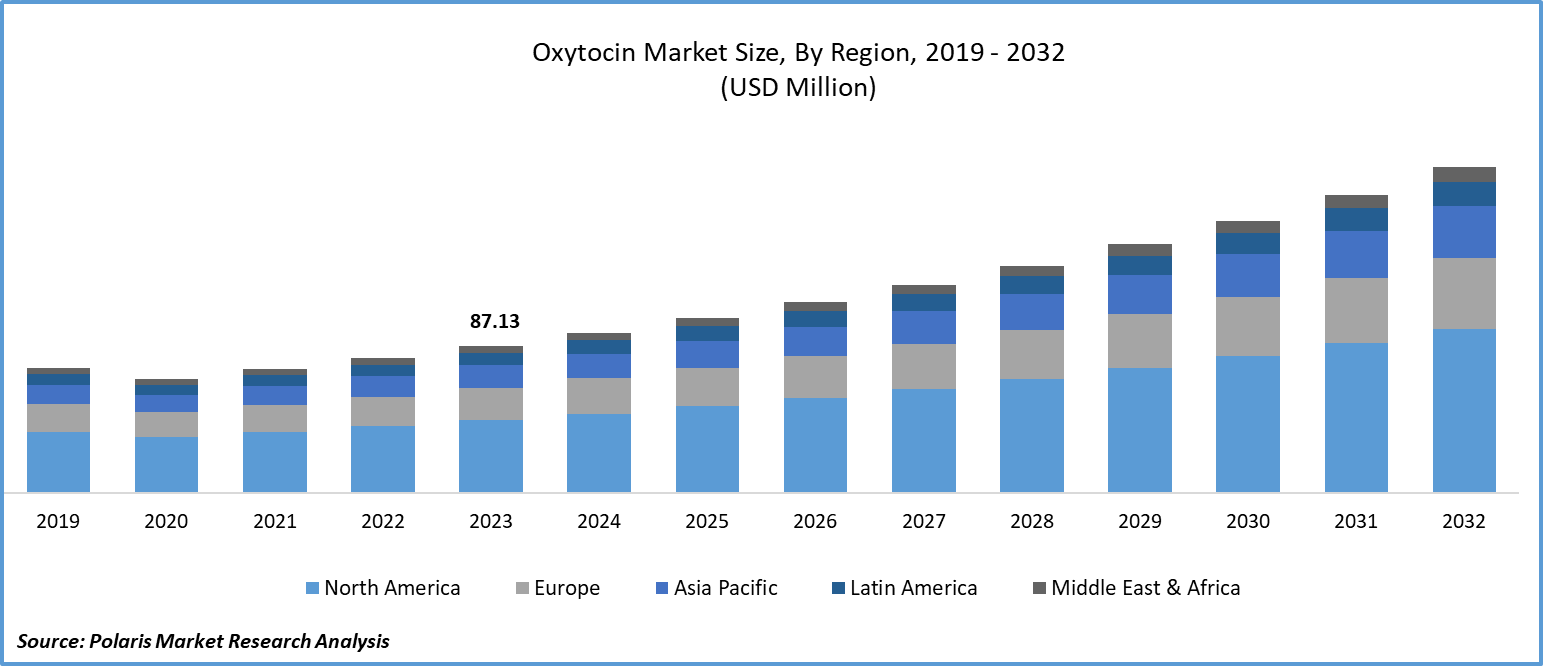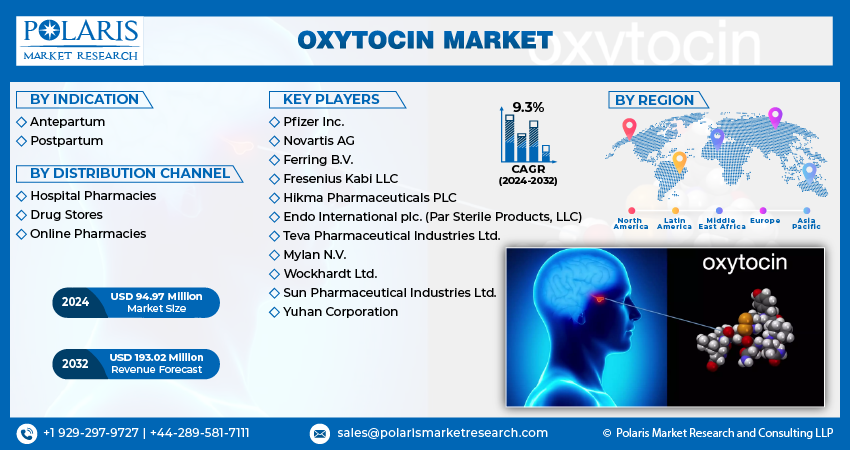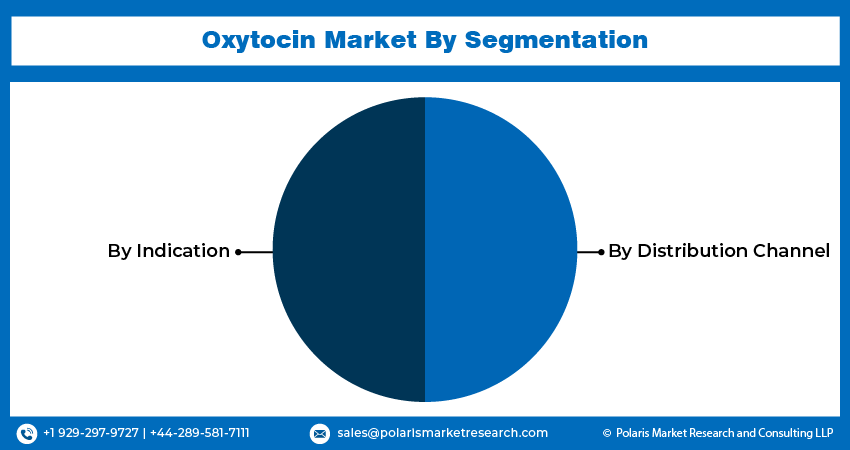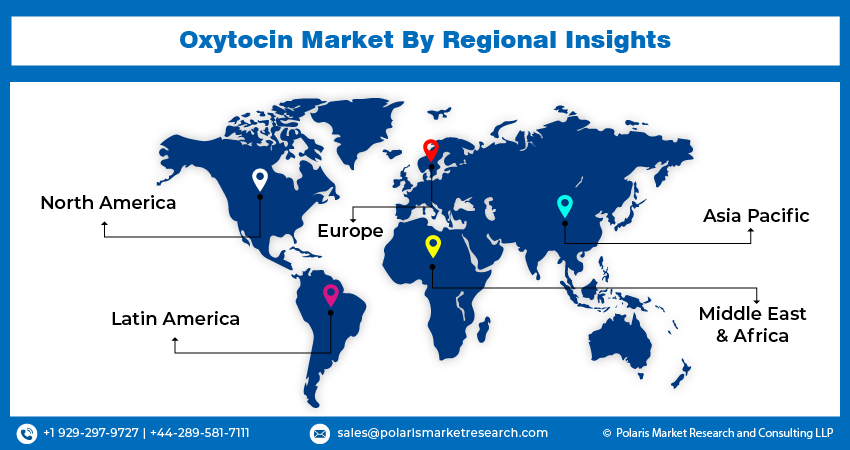
Oxytocin Market Share, Size, Trends, Industry Analysis Report, By Indication (Antepartum, Postpartum), By Distribution Channel, By Region, And Segment Forecasts, 2024 – 2032
- Published Date:Mar-2024
- Pages: 117
- Format: PDF
- Report ID: PM4789
- Base Year: 2023
- Historical Data: 2019-2022
Report Outlook
Global oxytocin market size was valued at USD 87.13 million in 2023. The market is anticipated to grow from USD 94.97 million in 2024 to USD 193.02 million by 2032, exhibiting a CAGR of 9.3% during the forecast period.
Market Overview
The oxytocin market witnessed moderate growth amid COVID-19 disruptions. Despite challenges in supply chain and manufacturing, demand for oxytocin remained steady due to its essential role in obstetrics and gynecology. Increasing awareness about its therapeutic benefits, including labor induction and prevention of postpartum hemorrhage, drove market growth. However, stringent regulations, limited access in developing regions, and patent expirations posed challenges. The market saw innovations in drug delivery systems and formulations. North America and Europe remained key markets, while Asia-Pacific showed potential for growth. Overall, the oxytocin market navigated pandemic-related hurdles, albeit with some setbacks, and is poised for gradual recovery and expansion.

To Understand More About this Research: Request a Free Sample Report
Key factors responsible for the oxytocin market growth include the escalating prevalence of pregnancy complications, a worldwide surge in childbirth rates, and heightened awareness regarding induced labor and breastfeeding. Oxytocin injections are employed to start or strengthen labor contractions and mitigate postpartum hemorrhage. Additionally, they may be combined with other therapies to terminate a pregnancy. Given its frequent application in childbirth and lactation, oxytocin is also utilized for rapid deliveries. It can be administered intravenously, intramuscularly, or intranasally.
Oxytocin, generated by the hypothalamus and released by the pituitary gland, plays a critical role in childbirth and male reproduction. Understanding oxytocin contributes to improved health management and enhances comprehension of human physiology. During childbirth, oxytocin is pivotal in initiating uterine contractions in women. This hormone prompts the contraction of uterine muscles, initiating labor, and augments the production of prostaglandins, which accelerates labor and intensifies contractions.
With global birth rates on the rise and an increasing number of pregnancies experiencing complications, coupled with growing awareness of induced labor and breastfeeding, the demand for oxytocin injections is expected to surge. Maternal mortality rates are resurging in numerous countries. In 2020, one woman lost her life every 2 minutes due to preventable causes associated with pregnancy. This equates to roughly 800 women per day—a maternal mortality ratio (MMR) of 223 maternal deaths per 100,000 live births. Between 2016 and 2020, maternal mortality ratios (MMRs) remained stagnant in 133 countries while notably increasing in 17 nations, primarily across Western Europe, North America, Latin America, and the Caribbean.
Growth Factors
Rise in abortion and unwanted pregnancies.
Teenage pregnancy and birth rates in the United States surpass those of any other developed nation. A global demographic shift has occurred due to declining birth rates and increased life expectancy, altering the age distribution of populations worldwide. Changes in birth rates result not only from shifts in age-specific fertility rates but also from changes in population structure. Despite declining birth rates globally, attributed to improvements in food security, prosperity, and urbanization, Theoretical Population Biology predicts the world population to exceed 8.2 billion by 2030 and possibly reach 8.9 billion by 2050.
Rise in cesarean deliveries.
The increasing prevalence of cesarean deliveries and the application of oxytocin during such procedures are significant catalysts for market expansion. Oxytocin facilitates uterine muscle contractions, thereby reducing bleeding and promoting a smoother postoperative recovery for mothers. Additionally, advancements in medical protocols and clinical practices have promoted the routine use of oxytocin in cesarean deliveries to improve patient safety and outcomes. According to the World Health Organization (WHO), the rate of cesarean section deliveries has been on the rise, accounting for over one in five (21%) of all childbirths. This trend is expected to continue over the next decade, with projections suggesting that nearly a third (29%) of all births will be conducted via cesarean section by 2030.

Report Segmentation
The market is primarily segmented based on indication, distribution channel, and region.
|
By Indication |
By Distribution Channel |
By Region |
|
|
|
To Understand the Scope of this Report: Speak to Analyst
By Indication Insights
The postpartum segment accounted for the notable oxytocin market share in 2023
The postpartum segment accounted for the largest oxytocin market share. Globally, maternal mortality rates have declined from 543,000 & 400 per 100,000, respectively, to 287,000 & 210 per 100,000 live births. To prevent postpartum hemorrhage (PPH), the WHO and professional bodies recommend active management of the third stage of labor (AMTSL) for all vaginal births.
Oxytocin injection is the primary uterotonic medication recommended for PPH prevention and treatment, demonstrating superior efficacy compared to ergometrine and other uterotonics with fewer adverse effects. Postpartum hemorrhage (PPH) occurs in approximately 2% to 5% of women after vaginal delivery and 6.5% after cesarean delivery, within the uterine atony accounting for nearly half of the cases.
By Distribution Channel Insights
The hospital segment held the majority oxytocin market share in 2023
The hospital segment held the majority of the oxytocin market share. Patients favor hospitals for their accessibility and treatment convenience. Pharmacists play a crucial role in upholding medication safety and quality control by strictly adhering to storage protocols and conducting routine inspections. Moreover, the substantial number of surgeries conducted in hospital environments is expected to drive the segment’s growth.

Regional Insights
North America region dominated the global oxytocin market share in 2023
The North American region dominated the global oxytocin market share, driven by the rising number of pre-term births, fertility rates, & increased healthcare spending. For instance, according to the Centers for Disease Control and Prevention (CDC) report titled 'Births: Provisional Data for 2021', the United States witnessed an uptick in both the number of births and the general fertility rate in 2021, marking the first increase in seven years. The report indicated a 1% rise in births from 2020, with 3,659,289 births recorded in 2021. Similarly, the preterm birth rate increased by 4% in 2021 to 10.48%, up from 10.09% in 2020. During the antepartum period, oxytocin aids in strengthening uterine contractions, aiming for the successful vaginal delivery of the fetus.
APAC is expected to grow at the fastest rate. This growth is attributed to heightened awareness of maternal health, escalating childbirth rates, and advancements in healthcare infrastructure. Initiatives aimed at improving the availability of crucial medications, such as oxytocin, in densely populated nations are significant drivers of the region's notable expansion.

Key Market Players & Competitive Insights
The oxytocin market exhibits a high level of consolidation, characterized by the strong presence of numerous regional and global players. Key firms engage in competition through factors such as introducing new products with improved efficacy, providing more cost-effective options, and employing effective marketing tactics.
Some of the major players operating in the global market include:
- Pfizer Inc.
- Novartis AG
- Ferring B.V.
- Fresenius Kabi LLC
- Hikma Pharmaceuticals PLC
- Endo International plc. (Par Sterile Products, LLC)
- Teva Pharmaceutical Industries Ltd.
- Mylan N.V.
- Wockhardt Ltd.
- Sun Pharmaceutical Industries Ltd.
- Yuhan Corporation
Recent Developments in the Industry
- In July 2023, Endo International & Premier partnered to tackle the shortage of Pitocin (oxytocin injection), a medication used to induce labor in pregnant women.
- In October 2023, Tonix Pharmaceuticals disclosed that the European Union (EU) had issued a patent concerning the utilization of intranasal potentiated oxytocin (TNX-1900) for pain management.
Report Coverage
The Oxytocin market report emphasizes key regions across the globe to provide users with a better understanding of the product. The report also provides market insights into recent developments and trends and analyzes the technologies that are gaining traction around the globe. Furthermore, the report covers an in-depth qualitative analysis pertaining to various paradigm shifts associated with the transformation of these solutions.
The report provides a detailed analysis of the market while focusing on various key aspects such as competitive analysis, indication, route of administration, distribution channel, and futuristic growth opportunities.
Oxytocin Market Report Scope
|
Report Attributes |
Details |
|
Market size value in 2024 |
USD 94.97 million |
|
Revenue Forecast in 2032 |
USD 193.02 million |
|
CAGR |
9.3% from 2024 – 2032 |
|
Base year |
2023 |
|
Historical data |
2019 – 2022 |
|
Forecast period |
2024 – 2032 |
|
Quantitative units |
Revenue in USD million and CAGR from 2024 to 2032 |
|
Segments Covered |
|
|
Regional scope |
|
|
Competitive Landscape |
|
|
Report Format |
|
|
Customization |
Report customization as per your requirements with respect to countries, regions, and segmentation. |
FAQ's
The global oxytocin market size is expected to reach USD 193.02 million by 2032
Key players in the market are Pfizer, Novartis, Ferring, Fresenius Kabi, Hikma Pharmaceuticals
North America contribute notably towards the global Oxytocin Market
Oxytocin market exhibiting a CAGR of 9.3% during the forecast period.
The Oxytocin Market report covering key segments are indication, distribution channel, and region.
